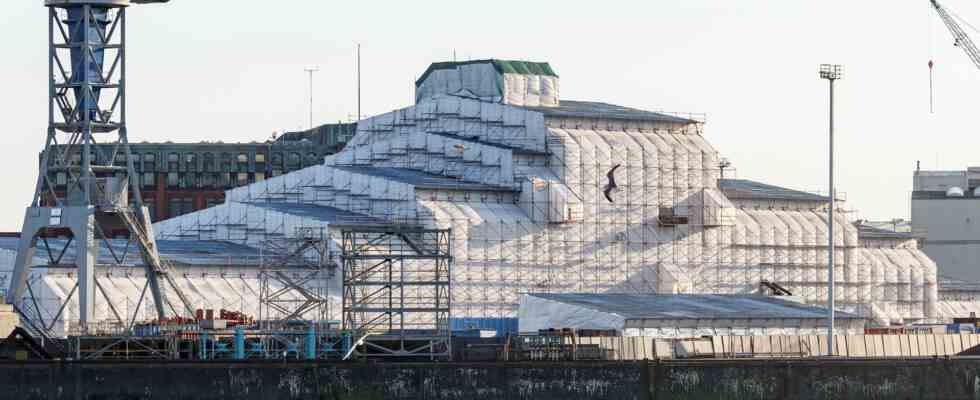Status: 03/09/2022 11:46 a.m
The assets of Russian oligarchs close to Putin should actually be frozen quickly in the West. Also in Germany. But that obviously works. Why actually?
A good week after the sanctions against so-called oligarchs came into force, it is unclear whether assets in Germany have already been frozen or confiscated. So far, there is no information from the federal government. However, there are indications that the implementation of the sanctions is more complicated than many public statements suggest.
At the beginning of the sanctions, the federal government and its allies gave the impression that sanctioned oligarchs would soon no longer have access to their assets in the West. US President Joe Biden, for example, announced in the US Congress in early March that the US and Europe would jointly confiscate yachts, luxury apartments and private jets from sanctioned Russian oligarchs.
EU sanctions apply in Germany
The President of the EU Commission, Ursula von der Leyen, also announced at the beginning of March that all assets would be frozen, regardless of whether they were yachts, fancy cars or luxury properties. The EU sanctions have also been in effect in Germany since the end of February. In addition to Russian President Vladimir Putin, this also affects his Foreign Minister Sergey Lavrov, numerous politicians and around two dozen so-called oligarchs, i.e. wealthy business people who are close to the Russian President.
Importance of sanctions stressed
Shortly after the sanctions came into force, there were already reports from Italy and France that yachts and villas were being confiscated. So far, there have been no corresponding reports from Germany. Representatives of the federal government recently emphasized the importance of the sanctions. So said Federal Minister of Finance Christian Linder (FDP) in the Report from Berlin, it is important to him to meet the oligarchs. “Anyone who profited from Putin and stole the wealth of the Russian people through corruption cannot enjoy their prosperity in our western democracies.”
Federal Economics Minister Robert Habeck (Greens) said last Thursday that the values of the “oligarchs should be frozen immediately”. He assumes “that the federal government will do what is necessary with the responsible authorities”.
Surprisingly vague statements
All of these statements sound clear. The federal government is taking care of the issue and driving it forward. And yet: If you ask specifically what has been done since the sanctions came into force at the end of February, the answers remain surprisingly vague. The spokesman for the federal government, Steffen Hebestreit, referred, for example, to the Bundesbank if one wanted information on the assets of the sanctioned oligarchs. When it comes to confiscations, you have to ask the prosecuting authorities of the countries.
Several authorities are involved in enforcing the sanctions in Germany, including the Bundesbank, the Federal Office of Economics and Export Control, customs and law enforcement agencies. If you ask there, you often end up back with the federal government. For example, the Bundesbank, at the request of the ARD Capital Studios with: You pass on the confidential information on frozen assets to the Federal Ministry of Economics.
“Established Structures and Processes”
On request, the Federal Ministry of Finance also stated that “within the Federal Government, the Federal Ministry for Economic Affairs and Climate Protection” is responsible for the “implementation of the sanctions”. On request this week, it says in writing: There are “established structures and processes” in the federal government, in the federal states and in the responsible enforcement and investigative authorities. These would now be “quickly geared towards an effective and efficient implementation of the Russia sanctions.”
identify assets
When implementing the sanctions, a key difficulty is likely to be identifying the assets of sanctioned oligarchs in Germany at all. The real owners of planes, luxury yachts or real estate regularly hide behind complicated corporate structures that involve several shell companies registered in different tax havens. Research projects such as the Panama Papers, the Paradise Papers and the Pandora Papers have shown that Russian oligarchs close to Putin also hide their fortunes in this way.
The federal and state governments are in possession of several tax CDs and also such data leaks. However, whether they will be used to enforce the sanctions – the Federal Government also gives information on this at the request of the ARD Capital Studios no information. One cannot comment on the details of operational measures.
More than a week after the sanctions against oligarchs came into force, it is therefore unclear how effective they are in Germany and whether assets have already been frozen or confiscated. The only thing that is publicly known at the moment is that a yacht costing several hundred million euros is in a dry dock in the port of Hamburg. It is said to belong to the sanctioned oligarch Alisher Usmanov. So far, however, it has not been officially confiscated. This also applies to several properties that the man on Tegernsee in Bavaria is said to own. Clearly clarified, the ownership structure has not yet been heard.

